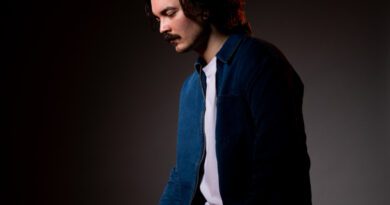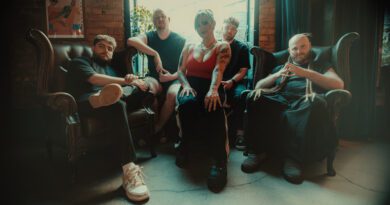A Chat with BAIBA (29.04.25)
Unafraid to celebrate reality in both its grit and glory, singer-songwriter BAIBA offers raw honesty, emotional depth and intimate introspection in her music. Hailing from Latvia, but now based in Austria, the self-produced musician uses confident performances and moving melodies to ensnare audiences. We speak with BAIBA about her new single, ‘Darkest Hour’, cultural influences, future plans and more.
OSR: Cliche, but what drew you to music? Why did you choose to become a musician?
BAIBA: I grew up in a rural Latvian countryside, quite isolated from the outside world and because of that as a child had a lot of time to be curious, explore, learn new things, read and listen to music. I developed a love for music very early on. My mother would bring me the first CDs of Eminem, Linkin Park, Coldplay, Avril Lavigne from the local post office and I would learn the songs by heart. Next to that I played piano, guitar and accordion and was obsessed with Latvian pop stars at that time. Music had become such a intertwined part of my life, that I don’t even think that I chose to be a musician, I could just not imagine my life without it anymore. I put music in the background when I studied literature, but after moving to Austria and meeting other like minded people, the desire to pursue it and to have this creativity that surrounds music creation as part of my daily life came back stronger than ever.
OSR: You recently released your single, ‘Darkest Hour’. What can you tell us about it? Is there a backstory or particular theme?
BAIBA: I wrote ‘Darkest Hour’ a couple of years ago in a production jam session with a friend of mine. Previous that year I had suffered a burn out and it was one of the first times when I started to be ready to be around people again, I was getting the spark back and wished to feel the energy of creating something together with other people. We drank wine, laughed and played around and the chorus of ‘Darkest Hour’ just came to me. It is an extremely personal song and vividly reminded me that even if I had this absolutely horrible time, the seeds of life were growing and resulted in this song and I pushed through.
OSR: You released a music video for ‘Darkest Hour’. What can you tell us about it?
BAIBA: Because of the personal story that surrounds ‘Darkest Hour’, I did not want to make a ‘real music video’ and chose to go with a visualiser that is made out of phone footage of me, my colleagues and friends in the year after the burn out. You can see spontaneously captured raw emotions in that video – I was having a great time and yet there are also moments where you can see the thoughtfulness, the gratitude of me feeling much better and being able to invest the work to be better. I wanted my audience to relate, to see the playful curiosity that I put in my little art endeavours with partly producing the music myself, partly making my own press photos, cutting my own videos etc. How healing art and way of living life can be. I feel like a girlie trying things out, experimenting, being up for adventures and cruising through life and I want to take my audience on this journey with me.
OSR: What is the most exciting thing about creating music?
BAIBA: Once you stop taking yourself and the industry so seriously, creating music can bring a lot of freedom. It was always extremely important for me to not lose my inner child and have a life set up in a way where I am not swamped in routines. I love the thrill of exchanging ideas, thinking of concepts, jamming, writing lyrics, thinking what kind of feeling I wish to portray with the sound I am creating, what kind of live concert experience I wish to transmit to my audience. It’s an exciting way to see your own life as a work of art. Music has helped me to redefine myself as an individual and has given me a frame to overcome my shyness, to be more brave, more bold. And the best part of it is that the art that you create can always stay fluid and grow, change together with your persona.
OSR: What about the most challenging thing about creating music?
BAIBA: It’s not a secret that the music industry is extremely tough. Probably every artist’s dream would be to be capable of investing their time and talent in creating and fulfilling their artistic purposes. Unfortunately in order to build sustainable financial conditions and get the music out there for the right listener, there are so many other things that need to be taken care of and that can be stressful and discouraging. There is a lot of competition, rejection and expectation to stay ahead of the game at all times, which can pretty fast give an impression that you are always behind. That’s why a while ago I decided that although I always have the desire to improve and to work hard, I should also not take myself too seriously, to not get lost in the music industry jungle and to not lose the joy that making music is giving to me.
OSR: Born in Latvia but based in Austria, do you think your culture and lifestyle has an influence on your music? If yes, how?
BAIBA: There is definitely a cultural mix coming into a play. I grew up quite isolated and surrounded by Latvian culture, which the same as Nordic culture is quite melancholic and dark. It’s absolutely beautiful and touching and there is a certain nostalgia for the past or for the times we will never have. The weather is cold and foggy with beautiful and green summers. I think growing up in this environment has affected my art a lot. Although after moving to West Europe I wanted to rid this constant existential sorrow that was inside me, and I fell in love with pop music, you can still hear in the lyrics and soundscape the poetic Nordic influence. I believe that music is a powerful medium to process our darkest pains and fears, yet I didn’t wish to get sucked into this state. So now my motto at live concerts is – if I have to process something painful and write a song about it, I wish for people in the audience to cry and dance at the same time.
OSR: What does music mean to you?
BAIBA: Music for me is freedom. Freedom to live life on your own terms, to see yourself and the life as work of art, to free myself from social expectation, from judgement. It is a powerful medium to process sorrow, to bring joy to oneself and people around and to remind myself to stay curious, to stay silly, to stay aware yet a fighter.
OSR: What do you hope people take from ‘Darkest Hour’ and your music in general?
BAIBA: I hope they can relate. I hope that they can feel inspired and more free to live and I hope they feel joy and hope when they are at my shows or listen to my music.
OSR: What can we expect from BAIBA in the future?
BAIBA: I am working on a new album called DELUSIONAL, where I am playing a lot with expectations of society and the expectations I have for myself. Many of the songs are quite satiric and cheeky. The sound is a little more raw as well, going more into the direction of alt pop and moving away from the heavy electronic influences that I had in the last years. I am very excited to share this new chapter with the listeners so stay tuned!
OSR: Do you have a message for our readers?
BAIBA: Stay curious and stay courageous.
Many thanks to BAIBA for speaking with us. Find out more about BAIBA on her official website, Facebook, Instagram and Spotify.
This artist was discovered via Musosoup #sustainablecurator


